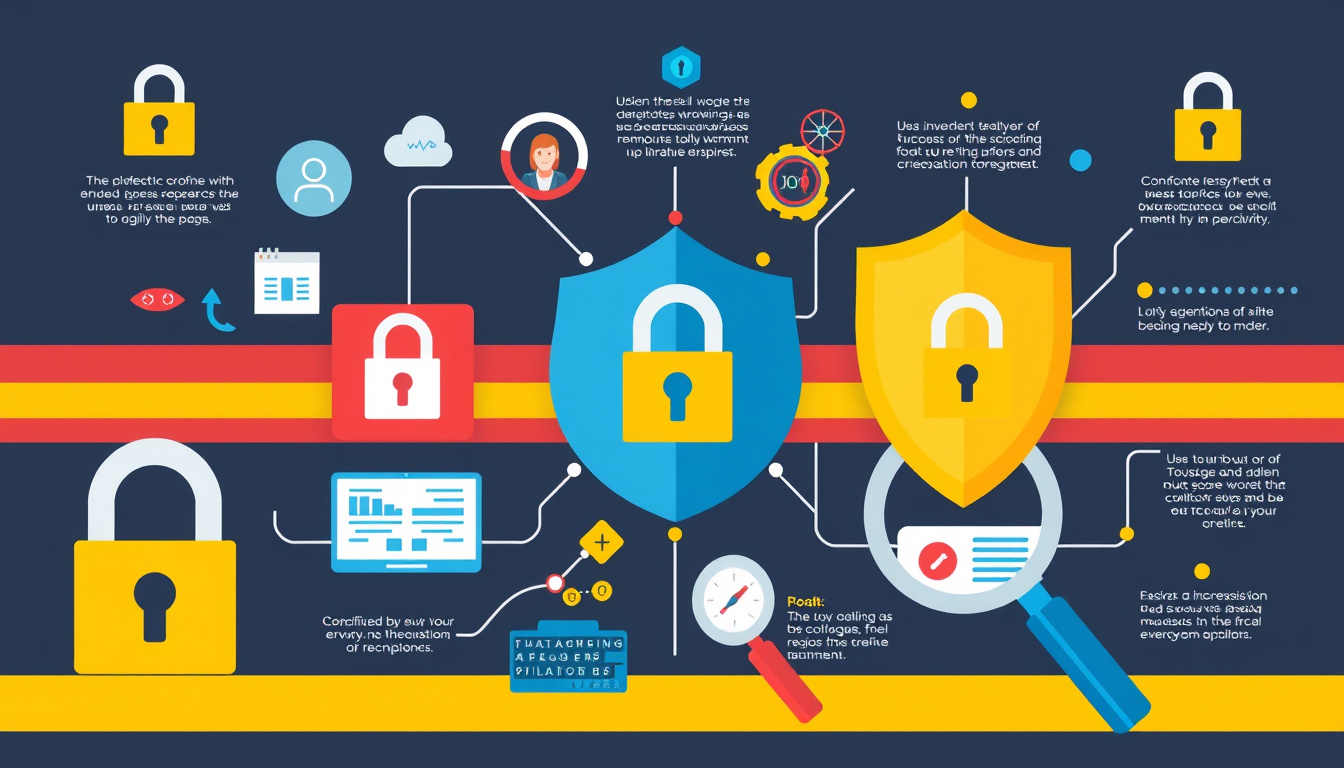📊 Ensuring Data Privacy and Compliance Explained Simply

In today's digital landscape, where data is an invaluable asset for businesses, understanding how to protect and manage this information is critical. 📊 Ensuring Data Privacy and Compliance Explained Simply is not just an essential topic for IT professionals but for anyone who interacts with personal or sensitive information. This article will take you through the fundamentals of data privacy, the regulations that govern it, key principles to uphold, the significance of compliance, effective strategies to safeguard data, and the common challenges organizations face on this journey. By the end, you’ll have a clearer understanding of what it means to prioritize data privacy and compliance in your organization.

Key Takeaways
- Data privacy is critical for protecting personal information in today's digital landscape.
- Understanding regulations like GDPR and CCPA is essential for organizations to remain compliant.
- Key principles such as data minimization and consent are foundational to effective data privacy strategies.
- Compliance not only builds trust with customers but also mitigates legal risks for organizations.
- Implementing robust policies and training can help overcome common data privacy challenges.
Introduction to Data Privacy and Compliance
In today’s digital age, ensuring data privacy and compliance explained simply becomes increasingly crucial for businesses and individuals alike. As data breaches and privacy concerns escalate, understanding the principles of data privacy is paramount. Compliance with data protection regulations, such as the General Data Protection Regulation (GDPR) and the California Consumer Privacy Act (CCPA), not only protects sensitive information but also fosters trust between companies and their customers. This introduction aims to demystify the complex landscape of data privacy laws and compliance requirements, providing a foundational understanding of how organizations can secure personal data while meeting legal obligations. By implementing effective data privacy strategies, businesses can safeguard their reputation and develop a competitive edge in an increasingly privacy-conscious market.
Understanding Data Privacy Regulations
In today's digital landscape, 📊 ensuring data privacy and compliance explained simply is crucial for businesses of all sizes. Data privacy regulations, such as the General Data Protection Regulation (GDPR) in Europe and the California Consumer Privacy Act (CCPA) in the United States, set foundational standards for how organizations handle personal information. Understanding these regulations not only protects individuals' rights but also shields businesses from potential fines and reputational damage. Compliance requires robust data governance, transparency in data collection practices, and an effective response strategy to potential breaches. As technologies evolve and more personal data is generated, prioritizing data privacy will not only foster consumer trust but also position companies as responsible stewards of information.
'In data privacy, trust is earned, not given.' - Unknown

Key Principles of Data Privacy
In today’s digital age, understanding the key principles of data privacy has become crucial for individuals and businesses alike. 🔑 Ensuring Data Privacy and Compliance Explained Simply revolves around several foundational concepts that help protect sensitive information. Firstly, consent is paramount; users must be informed about how their data will be used and must agree to it before any processing occurs. Secondly, transparency is vital; organizations should provide clear privacy notices outlining what data is collected, why it’s needed, and how it will be stored. Thirdly, data minimization is an essential principle; businesses should only collect data that is necessary for their specific purposes. Furthermore, organizations should implement robust security measures to safeguard data against breaches. Lastly, individuals should be empowered with access rights, allowing them to view, correct, or delete their personal information. By adhering to these principles, businesses can enhance user trust while ensuring compliance with regulations like GDPR and CCPA.
Importance of Compliance in Organizations
In today’s digital age, ensuring data privacy and compliance explained simply is crucial for organizations of all sizes. Compliance with data protection regulations not only protects sensitive information but also builds trust with customers. When organizations adhere to frameworks such as GDPR, HIPAA, or CCPA, they demonstrate a commitment to safeguarding personal data. This importance cannot be overstated; breaches can lead to severe financial penalties and loss of reputation. Furthermore, a strong compliance culture encourages accountability and ethical behavior among employees, fostering a robust environment where data privacy is prioritized. Ultimately, organizations that prioritize compliance are better positioned to navigate the complexities of data management, maintain customer confidence, and succeed in a competitive marketplace.

Strategies for Ensuring Data Privacy
In an increasingly digital world, ensuring data privacy and compliance explained simply is more crucial than ever for businesses and individuals alike. One effective strategy is to implement robust data encryption practices, which protect sensitive information from unauthorized access. Additionally, regular audits of data handling processes can help identify vulnerabilities and ensure that compliance with privacy regulations, such as GDPR or CCPA, is maintained. Training employees on data protection policies and the importance of safeguarding personal information fosters a culture of privacy within the organization. Furthermore, utilizing privacy-by-design principles in software development can create systems that prioritize security from the outset, minimizing risks. By adopting these strategies, organizations can create a solid foundation for ensuring data privacy and achieving compliance.
Common Data Privacy Challenges and Solutions
In today’s digital landscape, 📊 ensuring data privacy and compliance is more crucial than ever. Organizations face several common challenges that can impede their efforts to protect sensitive information. One major challenge is the rapidly evolving regulatory environment, with laws like the General Data Protection Regulation (GDPR) and the California Consumer Privacy Act (CCPA) introducing stringent requirements for data handling. To solve this, businesses can invest in compliance management solutions that streamline regulatory updates and automate necessary processes. Another significant challenge is the risk of data breaches, which can arise from outdated security protocols or insufficient employee training. Implementing robust cybersecurity measures, such as end-to-end encryption and regular security training sessions for staff, can significantly mitigate these risks. Additionally, many organizations struggle with data fragmentation, with sensitive information stored across multiple systems. A centralized data management system can enhance visibility and control over data access and usage. By addressing these challenges effectively, organizations can not only comply with relevant regulations but also build trust with their customers around 📊 ensuring data privacy and compliance explained simply.

Conclusion: The Future of Data Privacy and Compliance
In summary, as we navigate the complex landscape of data privacy and compliance, it becomes increasingly crucial for businesses and individuals alike to prioritize these issues. 📊 Ensuring Data Privacy and Compliance Explained Simply encapsulates the essence of what organizations must embrace to protect sensitive information and adhere to regulatory standards. As technologies evolve and data breaches become more prevalent, the future will see a stronger emphasis on transparency, user control, and robust security measures. Companies must not only invest in advanced data protection technologies but also foster a culture of compliance that empowers employees to understand their responsibilities. Ultimately, as we move forward, the ability to effectively manage data privacy and compliance will not only safeguard an organization's reputation but also build trust with customers, ensuring success in an increasingly data-driven world.
Frequently Asked Questions
What is data privacy and why is it important?
Data privacy refers to the proper handling, processing, and storage of personal information to protect individuals' rights. It is important because it helps safeguard sensitive information, maintain trust with customers, and comply with legal regulations.
What are some key data privacy regulations?
Key data privacy regulations include the General Data Protection Regulation (GDPR) in Europe, the California Consumer Privacy Act (CCPA) in the United States, and the Health Insurance Portability and Accountability Act (HIPAA) for healthcare information.
What are the main principles of data privacy?
The main principles of data privacy include consent, data minimization, purpose limitation, accuracy, storage limitation, security, and accountability.
Why is compliance essential for organizations?
Compliance is essential for organizations to avoid legal penalties, enhance their reputation, protect customer information, and build trust with stakeholders.
What are some strategies to ensure data privacy in organizations?
Strategies to ensure data privacy include implementing robust data protection policies, conducting regular audits, employee training on data handling, using encryption, and adopting privacy-by-design principles in systems and processes.
Authored by - Abdulla Basha
Email id - mail@abdullabasha.com
Linkedin